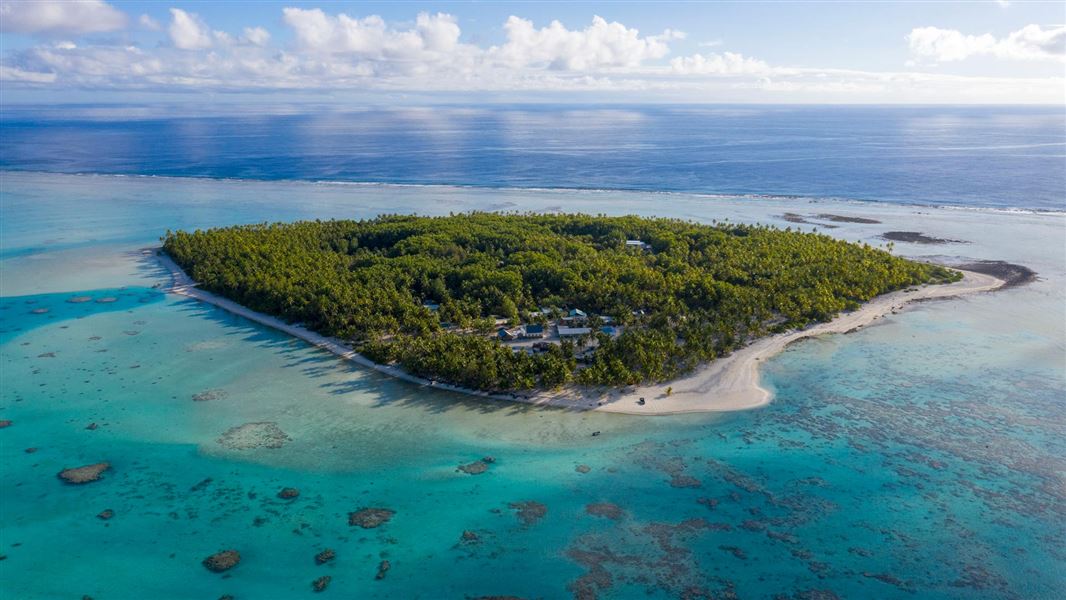Archived content: This media release was accurate on the date of publication.
Date: 04 April 2023
Rats on the Cook Islands’ Palmerston Atoll could be gone for good by year’s end, making a massive difference to the island’s community and biodiversity.
At the request of the community, a full-scale rat eradication will take place mid-2023. New Zealand’s Department of Conservation will lead the operation in collaboration with Palmerston’s community, the Cook Island’s National Environment Service, the Ministry of Agriculture, and the local NGO, Te Ipukarea Society.
Pacific rats arrived on the motu from early Polynesian voyaging. Ship rats most likely arrived in the 20th century on copra trading vessels. Rats have been a problem ever since.
Palmerston’s Executive Officer Arthur Neale says rats are a real menace to both community wellbeing and ecosystems.
“Rats destroy our wildlife, ruin crops, steal food from pantries, and even eat our clothes.”
Palmerston Atoll’s council commissioned a natural resources study in 2018, which laid out the extent of the rat problem.
“The findings showed we had very little birdlife on islets where rats were present. By eradicating rats, hopefully our birdlife can come back to our island,” Arthur Neale says.
Palmerston has a fluctuating population of around 40 people who live on the atoll’s only occupied islet. The atoll is 400km away from Rarotonga and because of its isolation, locals rely heavily on locally grown and harvested food.
Palmerston is also a nesting site for many seabirds including brown booby, frigate birds and the red-tailed tropic birds as well as its only land bird, the Pacific pigeon. Plants include coconut, tamanu/Pacific mahogany and a few citrus and pawpaw trees.
Invasive species like rats can overwhelm ecosystems and make communities more vulnerable to the impacts of climate change, by destroying indigenous plant communities as well as competing for food production.
In November 2022, Em Oyston and Finlay Cox from DOC’s National Eradication Team travelled to Palmerston and ran a three-week feasibility study with Cook Island agencies and the Palmerston administration team, known collectively as the RAT team.
Research included identifying the distribution of rats, determining the amount of bait needed to eradicate the rats, and identifying social issues such as the impact of the eradication work on people’s daily activities.
Em Oyston says it was great to see the progression and transfer of knowledge between the RAT team members and the Palmerston community.
“We look forward to returning to Palmerston in July, when we’ll kick off the eradication. Successfully removing every single rat will require hard work and everyone’s input, but the benefits for the atoll’s wildlife and community will be significant.”
Em Oyston says the project will help advance DOC’s knowledge in island eradications, making it a win for New Zealand’s Predator Free 2050 programme as well as Predator Free Pacific – a programme of the Pacific Regional Invasive Management Support Service (PRISMSS).
Elizabeth Munro, Manager Environmental Department, Cook Islands National Environment Service, says the Cook Islands is happy to be working with New Zealand’s Department of Conservation on the rat eradication program.
“Palmerston is one of our most remote islands. The removal of rats will provide benefits to biodiversity and food security on the island. We look forward to declaring a rat-free island and ‘aere ra e te rats’.”
Background information
This work is funded by the New Zealand Ministry of Foreign Affairs and Trade (MFAT), and is delivered through the Pacific Regional Invasive Species Management Support Service (PRISMSS).
The New Zealand Department of Conservation, the Secretariat of the Pacific Regional Environment Programme (SPREP), and Manaaki Whenua have joined forces to support Pacific Island Countries and Territories to take stronger action against invasive species, and thereby build resilience to climate change.
Contact
For media enquiries contact:
Email: media@doc.govt.nz
